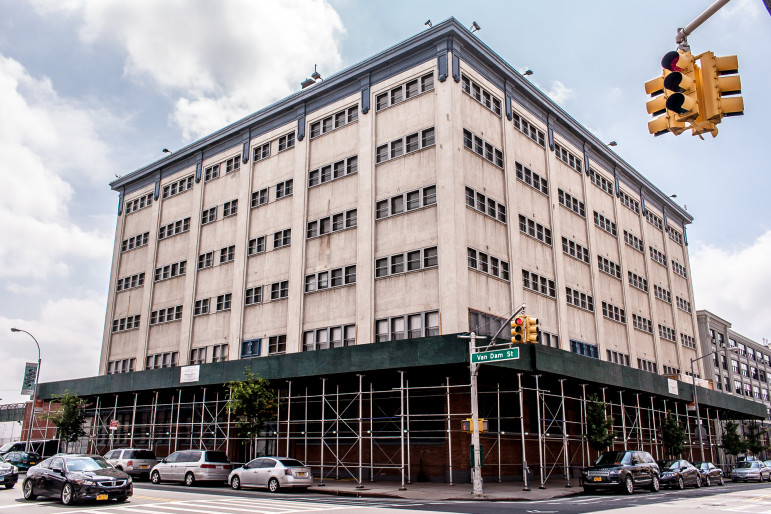Cuomo has failed to implement widely accepted sound public health practices by refusing to release any meaningful number of the state’s COVID-vulnerable imprisoned human beings, and now by failing to put them in the first categories for access to the new vaccines.

Adi Talwar
Queensboro Correctional Facility.New York State and the country were transfixed last spring by Governor Andrew Cuomo’s forceful, straightforward commentaries and policies toward combating the COVID-19 pandemic. In November, the New York Academy of Medicine, in recognition, gave Cuomo their prestigious Stephen Smith Medal for Distinguished Contributions to Public Health. Yet in reality, Cuomo has failed to implement widely accepted sound public health practices by refusing to release any meaningful number of the state’s COVID-vulnerable imprisoned human beings, and now by failing to put them in the first categories for access to the new vaccines. Containment of this pandemic depends on what happens to the most vulnerable; pandemics reveal whether we really care about all human beings.
The idea of acting now to increase release mechanisms such as parole and clemency, especially for aging prisoners, is far from radical. Cuomo’s failure to bring best public health practices to the state’s prisons contradicts the advice from the American Public Health Association, the American Medical Association, and other public health and medical organizations. A study published in July in the Journal of the American Medical Association, before the current surge, found that the COVID-19 case rate for prisoners in federal and state institutions was 5.5. times higher than the U.S. population case rate. And as the New York Times reported on Dec. 20, according to Dr. Emily Wang, the director of the Yale School of Medicine’s Health Justice Lab, “If we don’t have larger-scale decarceration efforts, we won’t control COVID.”
Corrections officers in those institutions risk onward local community transmission, often in rural areas with fewer hospitals. Overcrowding, the lack of separate toilets and sinks, absence of effective PPE, the inability to practice social distancing, and populations with higher numbers of underlying conditions make prisons the perfect hothouses for explosive COVID transmission. Indeed, the latest news documents that one in five prisoners in the United States had COVID. The numbers will only get worse.
The people Cuomo’s policies are harming are overwhelmingly African American and Latinx, who suffer at higher rates of underlying conditions than their peers outside the walls, and include more than 8,000 older incarcerated women and men serving long sentences. Years of evidence show that thousands of those people have transformed their lives, taken deep responsibility for the damage they caused, and pose little or no risk of committing a new crime if released.
 CityViews are readers’ opinions, not those of City Limits. Add your voice today!
CityViews are readers’ opinions, not those of City Limits. Add your voice today!
If the wisdom of public health experts and criminal justice experts was recognized, New York State would long since have released thousands of deserving New Yorkers and placed incarcerated people among the first phase recipients of the vaccine. Instead, the past 16 days alone have seen six more COVID deaths in New York prisons.
Six states have already put incarcerated people into their phase one for vaccines. New York has not. Such an action would at least act as “harm reduction” in public health parlance. However, given the documented low public safety risk posed by many categories of prisoners, in particular older persons serving long sentences, decarceration of a substantial number of incarcerated New Yorkers is the truly appropriate public health intervention.
Two bills before the state legislature would accomplish, in part, meaningful decarceration as a public health intervention. Elder Parole, sponsored by Assembly Member Carmen De La Rosa and Senator Brad Hoylman, would allow people aged 55 and older who have served at least 15 years to appear before the parole board for consideration of release, no matter the original sentence or crime. Fair and Timely Parole, sponsored by Senator Gustavo Rivera and Assembly Member David Weprin, would instruct the Board of Parole to base release decisions on an applicant’s current character, behavior, and public safety risk level, rather than on the original offense committed many decades ago.
In combination, these bills would mitigate enormously the damage that the current COVID pandemic, as well as any future pandemic, could wreak on New York State prisons and communities—as well as significantly reducing the massive damage to public health caused by our society’s imposition of excessive and inhumane punishment. Governor Cuomo’s refusal to grant a meaningful number of clemencies belies his being honored as a public health champion. We already know that Governor Cuomo does not follow all the public health wisdom and practice. We hope the New York State legislature will.
David Hoos, M.D., MPH, works for Columbia University’s Mailman School of Public Health. Susan M. Reverby, Ph.D, is a Wellesley College Professor Emerita and the author of Examining Tuskegee. Barbara Zeller, M.D., is a prisoner medical advisor. Dr. Robert Fullilove is a professor and associate dean at Columbia University’s Mailman School of Public Health.








